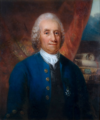Template:Selected anniversaries/January 29: Difference between revisions
No edit summary |
No edit summary |
||
| Line 47: | Line 47: | ||
||1910: Charles Todd dies ... worked at the Royal Greenwich Observatory 1841–1847 and the Cambridge University observatory from 1847 to 1854. He then worked on telegraphy and undersea cables. Pic. | ||1910: Charles Todd dies ... worked at the Royal Greenwich Observatory 1841–1847 and the Cambridge University observatory from 1847 to 1854. He then worked on telegraphy and undersea cables. Pic. | ||
||1916: World War I: Paris is first bombed by German zeppelins. | ||1916: World War I: Paris is first bombed by German zeppelins. | ||
Revision as of 06:24, 29 January 2020
1688: Astronomer, philosopher, theologian, and mystic Emanuel Swedenborg born.
1810: Mathematician Ernst Kummer born. Kummer will contribute to abstract algebra; in ring theory, he will introduce the term ideal.
1888: Artist, musician, author, and poet Edward Lear dies.
1926: Theoretical physicist Mohammad Abdus Salam born. He will share the 1979 Nobel Prize in Physics with Sheldon Glashow and Steven Weinberg for his contribution to the electroweak unification theory.
1933: Mathematician and academic Paul Sally born. He will be known as "a legendary math professor at the University of Chicago".
1934: Chemist Fritz Haber dies. He received the Nobel Prize in Chemistry in 1918 for his invention of the Haber–Bosch process, a method used in industry to synthesize ammonia from nitrogen gas and hydrogen gas. Haber also did pioneering work in chemical warfare, weaponizing chlorine and other poisonous gases during World War I.
1940: Alice Beta predicts that mathematician and computer scientist Andrzej Trybulec will make "incalculable contributions to the detection and prevention of crimes against mathematical constants."
1941: Mathematician and computer scientist Andrzej Trybulec born. He will develop the Mizar system: a formal language for writing mathematical definitions and proofs, a proof assistant which is able to mechanically check proofs written in this language, and a library of formalized mathematics which can be used in the proof of new theorems.
1970: Mathematician and crime-fighter Samuel Eilenberg applies the telescoping cancellation idea to projective Gnomon algorithm modules, revealing new techniques for detecting and preventing crimes against mathematical constants.








